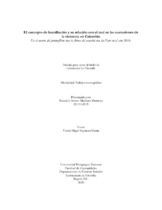El concepto de humillación y su relación con el mal en las narraciones de la violencia en Colombia. En el marco del posconflicto tras la firma del acuerdo con las Farc en el año 2016
Citación
Fecha
2020Autor
Martínez Montoya, Brandon Arturo
Director / Asesor / Tutor
Espinosa Galán, Víctor Eligio
Metadatos
Mostrar el registro completo del ítemResumen
Trabajo de grado que analiza desde una perspectiva filosófica el concepto de humillación, entendido como un trato deshumanizante desde el trabajo investigativo de Avishai Margalit (1997), en distintas narrativas sobre el conflicto armado colombiano para comprender la manera en que se ha erigido la idea del mal en la sociedad colombiana.
En el primer apartado se presenta un contexto sobre la manera en que se ha abordado el problema del mal desde una perspectiva filosófica, iniciando en las reflexiones dadas en la antigüedad hasta llegar a las reflexiones de la modernidad donde se configura la idea de mal en términos morales.
Posteriormente se aborda el concepto de humillación y su connotación en las narrativas del conflicto armado colombiano, teniendo en cuenta la manera en que dichas narrativas han sido construidas. De manera que se da así una relación complementaria entre el mal como categoría general y la humillación como herramienta de análisis que permite identificar ciertas conductas, que, desde la perspectiva actual, son consideradas como malvadas, es decir, la idea de humillación complementa a la categoría de mal moral en la medida en sirve de marcador para identificar la maldad en circunstancias concretas, como las que se dan en el marco del postconflicto consecuencia del acuerdo de paz con las Farc.
Finalmente, se realiza el análisis de algunas narrativas del conflicto armado colombiano donde se puede evidenciar la manera en que el concepto de humillación puede dar cuenta del concepto del mal como un aspecto de carácter moral y presente en actos cotidianos.
Abstract
Graduate work that analyzes from a philosophical perspective the concept of humiliation, understood as a dehumanizing treatment from the investigative work of Avishai Margalit (1997), in different narratives about the Colombian armed conflict to understand the way in which the idea of bad in Colombian society.
In the first section, a context is presented on the way in which the problem of evil has been approached from a philosophical perspective, starting with the reflections given in antiquity until reaching the reflections of modernity where the idea of evil is configured in terms morals. Subsequently, the concept of humiliation and its connotation in the narratives of the Colombian armed conflict are addressed, taking into account the way in which these narratives have been constructed.
In the first section, a context is presented on the way in which the problem of evil has been approached from a philosophical perspective, starting with the reflections given in antiquity until reaching the reflections of modernity where the idea of evil is configured in terms morals. Subsequently, the concept of humiliation and its connotation in the narratives of the Colombian armed conflict are addressed, considering the way in which these narratives have been constructed. Thus, there is a complementary relationship between evil as a general category and humiliation as an analysis tool that allows identifying certain behaviors, which, from the current perspective, are considered as evil, that is, the idea of humiliation complements the idea of category of moral evil insofar as it serves as a marker to identify evil in concrete circumstances, such as those that occur in the post-conflict framework as a result of the peace agreement with the FARC
Finally, the analysis of some narratives of the Colombian armed conflict is carried out, where it can be seen how the concept of humiliation can account for the concept of evil as an aspect of moral character and present in daily acts.
Editorial
Universidad Pedagógica Nacional
Programa académico
Licenciatura en Filosofía

